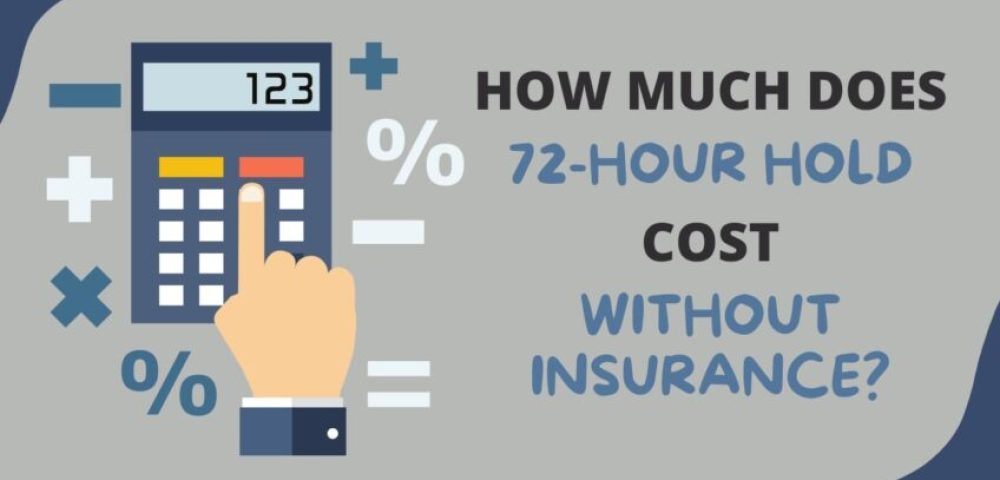Have you ever wondered how much it would cost to be placed on a 72-hour hold if you didn’t have insurance? It’s an important question that many people fail to consider until they find themselves in need of emergency psychiatric care.
In this post, we’ll explore the costs and discuss some options for those without insurance. So, buckle up because we’re about to take a deep dive into the world of mental health care costs!
Involuntary Psychiatric Hospitalization

A 72-hour hold is a temporary involuntary psychiatric hospitalization that lasts for up to 72 hours. It is a measure taken to ensure the safety of individuals who may be a danger to themselves or others due to a mental health crisis. This type of hold is commonly known as a “5150 hold” in the United States, referencing the California Welfare and Institutions Code section that permits it.
The cost of this hold varies widely depending on the facility, location, and specific circumstances. Without insurance, the cost can range from a few hundred dollars to tens of thousands of dollars.
The cost of a 72-hour hold can be broken down into several categories, including:
- Assessment and Evaluation: Before it can be initiated, an individual must undergo a psychiatric evaluation to determine if they meet the criteria for an involuntary hold. The cost of this evaluation can range from a few hundred to several thousand dollars, depending on the facility and the complexity of the evaluation.
- Treatment and Medication: During the hold, an individual will receive treatment and medication for their mental health condition. The cost of this treatment and medication can vary widely depending on the facility, the length of stay, and the individual’s specific needs.
- Accommodation: Some facilities offer private rooms, while others provide shared rooms or dormitory-style accommodation. The cost of accommodation can range from a few hundred to several thousand dollars.
- Additional Services: Some facilities may offer additional services during a 72-hour hold, such as therapy, group sessions, or recreational activities. The cost of these additional services can also vary widely.

In the United States, the cost of a 72-hour hold without insurance can be significant. According to a study conducted by the Government Accountability Office, the average cost in 2017 was $2,264. However, this cost can vary widely depending on the location and facility. In some cases, the cost can be as high as $30,000 or more.
One reason for the high cost is that mental health treatment is often not covered by insurance at the same level as a physical health treatment. This is known as the “mental health parity gap,” and it can result in higher out-of-pocket costs for individuals seeking mental health treatment.
In addition, it can be affected by the availability of mental health services in a given area. In areas where mental health services are scarce, the cost of treatment may be higher due to increased demand.
There are some options for individuals without insurance who need a 72-hour hold. Some facilities may offer financial assistance or sliding-scale fees based on income. Also, some states have programs that provide free or low-cost mental health services for individuals who meet certain criteria.
Overall, the cost without insurance can be significant, and it is important for individuals to be aware of their options and potential costs before seeking treatment. Seeking mental health treatment is an important step in maintaining overall health and well-being, and individuals should not let financial concerns prevent them from seeking the care they need.
How to Pay Without Insurance

If you or a loved one is considering a 72-hour hold, it’s important to know the potential cost. Unfortunately, many people don’t have health insurance that will cover the cost.
There are a few options available to help pay for a 72-hour hold without insurance. Here are some of them:
- Sliding Scale Fees: Some mental health facilities offer sliding-scale fees based on income. This means that the cost of treatment is adjusted based on the individual’s ability to pay. Individuals can inquire about sliding-scale fees when they contact mental health facilities.
- Financial Assistance Programs: Some mental health facilities offer financial assistance programs to help individuals pay for treatment. These programs may be based on income, and individuals can inquire about them when they contact mental health facilities.
- State-Funded Programs: Some states have programs that provide free or low-cost mental health services to individuals who meet certain criteria, such as income or diagnosis. Individuals can contact their state mental health agency to inquire about these programs.
- Medicaid: Medicaid is a federal and state program that provides health insurance coverage to low-income individuals and families. Depending on the state, Medicaid may cover mental health treatment, including a 72-hour hold. Individuals can contact their state Medicaid agency to inquire about coverage.
- Payment Plans: Some mental health facilities may offer payment plans to individuals who cannot afford to pay for treatment upfront. Payment plans allow individuals to spread the cost of treatment over time, making it more manageable.
- Crowdfunding: In some cases, individuals may turn to crowdfund platforms such as GoFundMe to raise funds to pay for mental health treatment. This can be a helpful option for individuals who do not have other means of paying for treatment.
It’s important to remember that getting help is always worth the cost. If you or someone you love is in need of treatment, don’t let the cost stand in your way. There are resources available to help make treatment affordable.
Watch this video for additional tips that can be useful:
Don’t stress and overthink it, you will find a suitable solution. Overthinking can have a serious impact on our mental health, especially when conditioned by negative self-talk.
If you liked this article be sure to check out how much do eyeglasses cost with no insurance?
Conclusion
In conclusion, a 72-hour hold without insurance can be expensive and should not be taken lightly. The cost of the stay itself will vary depending on the individual circumstances, but it is important to remember that there could also be additional costs associated with medications or other treatments related to the hospitalization.
It is always best practice to speak with your healthcare provider before making any decisions regarding medical care.
With an in-depth knowledge of supplements and a commitment to wellness, Sharon’s words inspire readers to embark on a transformative journey towards optimal health.















